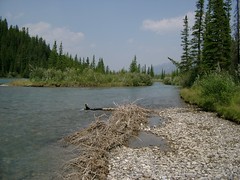
Image from Flickr
Globalization leads to international marketplaces and international trade. There’s a huge amount of fish trade around the world. The profit can be made higher, if you save the cost. In case of fishing, there is no manufacturing but it’s processing. Half of the fish today are processed in the other countries that were caught in.
The reality of fish trade today makes it basically impossible to count and know how much of them are there, and it’s very very difficult to manage your resource. You have a ship that’s going to catch it, transfer it to another ship, get it to a port, move around some more, process it, change the flags, ship it back, have a retailer ship it to the store. So it’s very hard to even know that the fish itself is really the same fish.
Half of the fish people are eating in UK is illegally caught.
There is a billion people in the world who depend on fish as their main protein source and can’t afford to buy it.
What’s the deep sea and what does it hold? It’s 99% of the plant. The largest habitat on the planet. Most animals that live on earth, have never seen the day life. There are loads and loads of animals that are new sciences. There is a new species discovered every 2 weeks.
Why should we care? What is the significance of these ugly gelatinous creatures? It’s a very utilitarian approach to the world, just asking this question. This approach is not a break of collapse and it doesn’t work.
We should care because all living things are connected. This system is called Earth and it’s incredible that all it works together. We’re playing wizards and it’s taking a high toll on the system.
Mass extinction is a really slow process. 98% of life can disappear in a process of life extinction. The biggest crisis of living is now, since we’re seeing 1000 times faster process and what’s going to disappear today it’s not going to have good condition to comeback later as in a more natural process. This is why Climate
Change is not the biggest right now. We first need to make sure there is something to save. These animals and habitats are going to be little oasis to comeback after the climate change problem is over in millions of years.
Fishing is a really big problem in general and it’s easy to damage environment. There is lots of numbers of fish, they trawling hard the place, but after 10 years there are no more fish.
Why is this happening?
Because it can. UNCLOS: no ban on bottom trawling, perfectly legal.
Because we’re encouraging it:
– From 1995 to 2005, about 30-34$ billion US$ subsidies to fishing sector.
– Oit subsidies 7-8 billion US$ each year. (Hence necessity to cut subsidies, role of WTO in the process).
Addressing this requires going back to history of overcapacity building up + common linear pattern
We’re actually managing to fish everything out. Even though the oceans are so big, we have so big technological power that we’re exhausting oceans. But it doesn’t work. Since 80% we’re seeing less catches.
We need to change the meme that there is enough fish. We need to take a step back, and change the old patterns and ideas.
From a common resource…
…To the tragedy of the Commons.
Expression “Tragedy of the commons†since essay published in Science in 1968 by Garett Hardin
Conclusions from global experience?
Globalization can have positive effect if accompanied by goo management schemes, I.e. Top-down bottom-approach: global governance guides for global resource, local implementation and translation.
Solutions on individual level
- Eat local
- Accept to the the “right†price. Cheap sea bass means farmed.
- Eat less fish
- Eat lower on the food chain
- Ban all bluefin tuna consumption: as close to extinction as giant panda

Cool, just found your site. I am interested in the world fish situation, worked in a fish factory and think about how the fish we eat today comes from deeper and deeper areas of the ocean.
Lets talk fish later…..thanks for blogging this, Brian/sctv